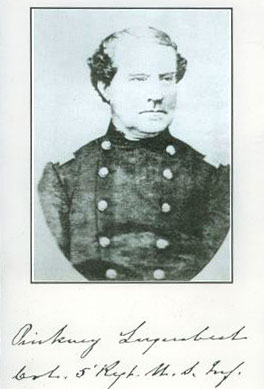Pinkney Lugenbeel
|
Pinkney Lugenbeel (1819-1886) - Born 20 Nov 1819 in Liberty, Frederick, Maryland. Died 18 Mar 1886 at Detroit, Michigan: Aged 66. During his distinguished military career he rose in rank from 2nd Lt. to Colonel and fought in three wars, the Mexican War, the Washington Indian Wars and the U.S. Civil War. He built two forts, Fort Colville and Fort Boise and commanded many others. He had a town and a county named after him, Pinkney City, Washington, and Lugenbeel County in the Dakota Territory (both since renamed to Coleville City and Bennett County, North Dakota).
U.S. Military Academy (1835-1840)Lugenbeel was appointed to the United States Military Academy at West Point in 1835 and studied there between 1 Sep 1835 and 1 Jul 1840. On graduation with the Class of 1840 he was assigned to the 5th U.S. Infantry with the rank of Brevet 2nd Lt. Second Seminole War (1840-1841)He sailed from New York harbor aboard the ship General Parkhill in Oct 1840 for Pilatka, Florida as a full 2nd Lt. In December he was on duty with Company E, 8th U.S. Infantry at Camp Riley, near Fort King, Florida. Frontier Duty (1841-1846)He was sent to Fort Gibson, Indian Territory, in 1841, and following that tour he served in Fort Winnebago, Fort Gratiot and then in the occupation of Texas which led to the Mexican War. Mexican War (1846-1848)He was engaged in the Battle of Monterey, 21-23 Sep 1846, the Siege of Vera Cruz, 9-29 Mar 1847, the Capture of San Antonio, 20 Aug 1847, the Battle of Churubusco, 20 Aug 1847, where he was wounded (made Bvt. Capt., 20 Aug 1847, for Gallant and Meritorious Conduct in the Battles of Contreras and Churubusco, Mexico), the Battle of Molino del Rey, 8 Sep 1847, the Storming of Chapultepec (made Bvt. Major, 13 Sep 1847, for Gallant and Meritorious Conduct in the Battle of Chapultepec, Mexico) and the Assault and Capture of the City of Mexico, 13-14 Sep 1847. Indian Territory (1848-1855)Following the Mexican War he was stationed at a succession of posts in the Indian Territories and Texas and finally to Fort Monroe in Virginia. He was promoted to Captain 3 Mar 1855 in the 9th U.S. Infantry at Fort Monroe, Virginia. Pacific Northwest (1855-1861)Captain (Bvt. Major) Lugenbeel was posted at Fort Vancouver, Washington in 1855; served in the defense of Fort Cascades, Washington; on the Yakima Expedition and from 1856 to 1859 at Fort Dalles, Oregon. In 1859 he was sent to establish Fort Colville, Washington. He arrived at the selected site, 14 miles southeast of the old Hudson's Bay Company's Fort Colvile with 4 companies of infantry on 21 Jun 1859 and began construction. He remained there, as commander, until Oct 1861 when he was withdrawn along with 355 regular troops to participate in the U.S. Civil War. The town of Colville, Washington is one of Washington's oldest cities and began as a small settlement outside of Fort Colville. It was first known as Pinkney City, named for Maj. Pinkney Lugenbeel. U.S. Civil War (1861-1865)Capt Lugenbeel was stationed in the Pacific Northwest during the early days of the U.S. Civil War recruiting volunteers and was promoted to Major in the 19th U.S. Infantry on 31 Dec 1862. He was chosen to select a site and supervise the building of Fort Boise, Idaho. Maj. Lugenbeel left Fort Walla Walla with a force of four companies of Oregon Cavalry and six companies of California infantry in May of 1863. He crossed the Snake River and proceeded up the Boise Valley to a point about 40 miles east of the original Hudson's Bay Company Fort Boise and established Boise Barracks at a point that is now in city limits of Boise, Idaho. He completed his assignment at Boise in Oct 1863 and then became Asst. Provost Marshal General for Oregon and Washington Territories until 1 Jan 1864. In Jan 1864 he assumed command of Fort Wayne, Michigan. In Mar 1865 he commanded a battalion at Lookout Mountain. Note: Up until the beginning of the U.S. Civil War Lugenbeel had an exceptional career, twice breveted for bravery in the Mexican War (to Captain and to Major) he was selected to command four companies that would build Fort Colville and support the U.S. Boundary Commission for two years while they established the United States-Canada border. In the beginning months of the U.S. Civil War President Lincoln forced all U.S. Army officers to reaffirm their oath of office and their loyalty to the Union, those that did not were forced to resign or were thrown out. All southern and border states officers immediately became suspect as secessionists and were treated with coolness and suspicion. Of the then 1,108 U.S. Army officers, 313 resigned, and 26 others were dismissed. Lugenbeel was born in Maryland, a border state, but he chose to stay with the Union. For the remainder of the war, Lugenbeel held some responsible positions but not as a combat commander. Post WarAfter the war he worked in the reconstruction effort and in 1867, he was promoted to Lt. Col. and posted as regimental commander, headquarters, Fort Smith, Arkansas, and then a succession of commands in Michigan, Dakota Territory, and New York. On 15 Dec 1880 he was promoted to full Colonel in the 5th U.S. Infantry. He retired from active service on 6 Feb 1882. Colonel Lugenbeel died in Detroit, Michigan on 18 Mar 1886 in his home and was interred in Elmwood Cemetery, Detroit, Michigan. His wife, Harriett, died on 14 Dec 1888. Father: John Lugenbeel (1792-1874), born 26 Dec 1792 in Unionville, Frederick County, Maryland. Died 26 Dec 1874 in Wadsworth, Ohio. Mother: Pamela Poole (1796-1888), born 27 Sep 1796 in Unionville, Maryland. Died 26 Apr 1888 in Wadsworth, Ohio. Marriage:
Children:
Assignments:
Links: Sources:
|
